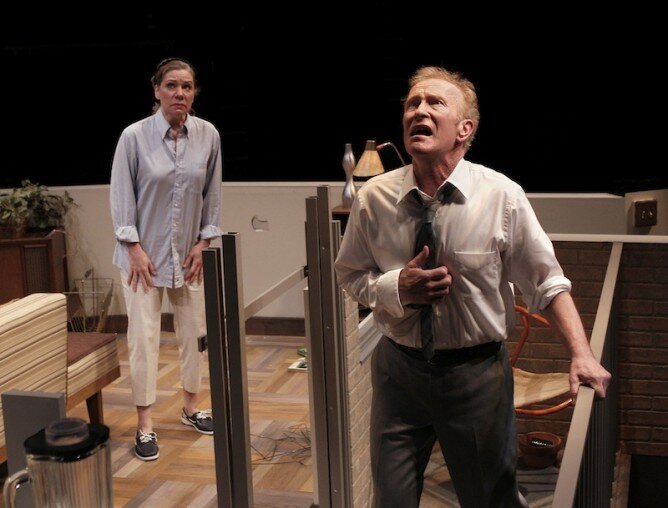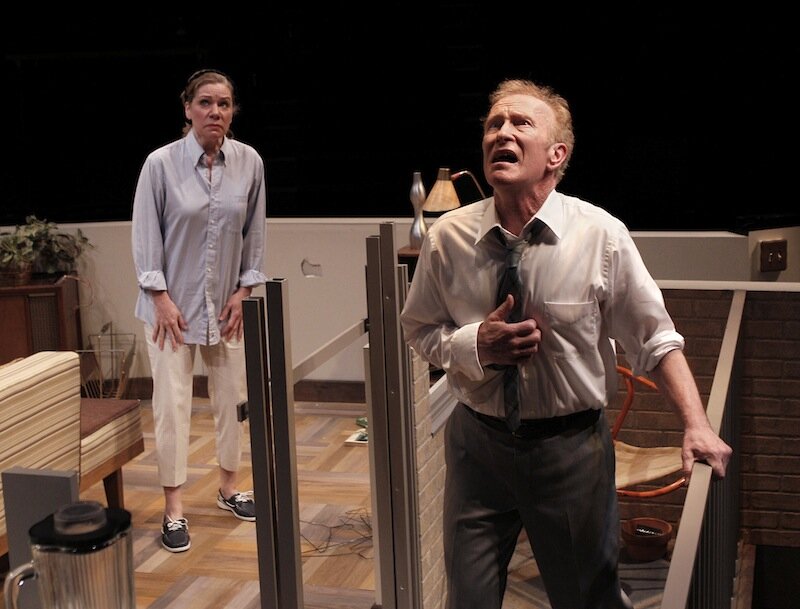
“I’m usually funniest when there’s trouble,” is how Neil Simon put it in one of his memoirs.
When you go see Warner Shook’s take on The Prisoner of Second Avenue (at ACT through May 29; tickets), you hear people laughing almost constantly. You can amass a typology of laughter out of the evening: the amused snort at put-downs, chortle of schadenfreude, horse laugh of impropriety, belly laugh of communal satisfaction.
Yet the plot synopsis would include sudden unemployment, deteriorating mental health, and televised intimations of the breakdown of civil society, as experienced by Mel and Edna Edison, a believable, just-past-middle-age couple, beset by slings and arrows of Lilliputian and Brobdingnagian size. What’s so damn funny?
The scene everyone mentions–it’s in John Lahr’s New Yorker profile of Simon–is when Mel freaks out on his wife about the sofa’s throw pillows:
You can’t even sit in here! Why do you keep these ugly little pillows on here? You spend eight hundred dollars for chairs and then you can’t sit on it because you got ugly little pillows shoved up your back.
By itself, what is this but verbal abuse? In Simon’s hands, this vitriol guarantees that every couple in the audience bursts into surprised laughter. Lahr quotes Simon:
“There is no joke there,” Simon said. “Yet, it was an enormous laugh—because the audience identified. That, more or less, is what is funny to me: saying something that’s instantly identifiable to everybody…. It’s a shared secret between you and the audience.”
Simon has rarely set himself the task of diagnosing ills and finding solutions; he’s not that kind of artist. His signature brush stroke is the one that immerses you in a real or imagined upset, then loops out to frame it, translating that identification into self-recognition. In the context of a theater, that means you spend all night hearing evidence that you are not alone–your private rage and shame, pain and misery, worry and nitpicking annoyance is the human condition.
He will do it over and over again, and you will laugh each time, and you even may come away thinking that’s just his schtick–powerful as this two-beat rhythm is (“Oh, that’s me,” “Wait, everyone else gets it!”).
But the genius moves of Neil Simon don’t end there. There’s also the simile that shades unsettlingly into forceful-because-mundane metaphor. There’s the gorgeous structure: Among the many things early on that Mel finds annoying is the song “Raindrops Keep Fallin’ On My Head,” which contains the lyric, “I’m never gonna stop the rain by complainin’.” Later, life throws cold water on Mel, not just raindrops. You can’t stop that by complaining, either.
Mel, 56, and Edna are the theatre-going “older couple,” with their tolerant bickering and negotiated dependencies, with their high-rise apartment and well-stocked liquor shelf–all of which is a chorus of identifying preferences, another way of putting the “like this” of simile. When Mel tries to hide his downsizing, Edna senses his anxiety and tells him he’s acting like a caged animal at the zoo.
Another playwright might concretize that–ACT TWO: Mel has become a rhino. But for Simon, it’s real life that is terrifying enough, provides ample suffering. Nor is the summation simply, “Once he loses his job, Mel is like a prisoner in his own home. Discuss.” Mel only feels like a prisoner; he’s about to get a taste of what imprisonment–unwanted, of uncertain duration–is. He will go crazy. In the Simonian moral universe, this is called gaining perspective: Things could be worse.
Under Shook’s direction The Prisoner of Second Avenue‘s topicality–it’s set in a cacophonous (thanks to Brendan Patrick Hogan’s sound design) New York in 1971–comes to feel classical: It’s the early days of the decline and fall, yet.
Comedy gives us distance; the play’s time and place sit far enough off (Matthew Smucker’s floorplan set, cinema verité in detail, makes great use of ACT’s sunken stage, and is pungent with ’70s touches like parquet squares and puce shag throw rug, light-mustard-yellow range) that we can hear about downsizing and doubt in the American promise and know today is coming but is not here yet. (Mel’s excursion into the wilds of talk radio may remind ACT patrons of Stephen Dietz’s more recent Yankee Tavern, which also found in talk radio an objective correlate of the paranoid style in American politics.)
Shook also has R. Hamilton Wright (Mel) and Anne Allgood (Edna) skip the Honeymooners impression; Allgood navigates a character whose doting solicitousness could feel dated–here, we see her maternal side, which Mel’s neurotic spells bring out, strained by his demands as he regresses. In a nice touch, while she’s above it all, in the high-rise, Allgood’s accent is only tinged with New York; when she returns to work, it comes back.
In Wright’s version, Mel is an apologizing badger–meekly snarling his discontent at everything around him, from the stuck-running toilet and noisy neighbors to his loss of status and fear of ruin. (In the play’s time, Mel, I think would have had sense of privilege enough to browbeat Edna without Wright’s line-walking diffidence, but Shook wants to keep you in the play, and there’s truth to this reading, too. In Simon’s directions, there’s a scene where Mel is like–or is he just?–an angry boy trapped inside with a baseball and mitt. Wright plays the moment differently, he’s more confused than sullen, bouncing the ball off things as if he is trying to remember what fun is about.)
Mel spins hilariously out of control, true, but when he confesses to Edna about his job, the audience collectively expels a breath. When he says, “I’m not through with my life yet…I still have value, I still have worth,” the theater is all ears.
Pull on any thread in Prisoner, and Simon’s mastery of the long needle is evident. That zoo comment of Edna’s? Simon picks it up later, when Mel explodes about not taking another trip to the zoo to while away his “free” time. He says the monkeys recognize him. It was his job, you realize, that made Mel act like a caged animal. Going to the zoo while looking for another job is a little too much like looking in the mirror at his old self.

This parallel-track reality not always in the service of comedy–Prisoner is remarkable for introducing four people to you late in the show, Mel’s estranged siblings. They happen to arrive just after Mel has been exhibiting signs of paranoia, so they are “called for” twice: In the one case because family would naturally appear, but also because they are people talking about Mel while he’s not there: a product of paranoia. It’s like theatrical judo–in the first scene, Mel is sure there’s a vast conspiracy against him, though he can’t nail down who’s behind it. In the next, there’s a conspiracy for him. But to be a prisoner of mental illness is not to be allowed the choice.
In Mel’s trio of sisters (played a little broadly but distinctively by Julie Briskman, Kimberly King, Cynthia Lauren Tewes) you see Simon press against his limits–they’ve come, but he doesn’t quite have time to welcome four people to the play. They’re Mel’s angels of mercy, he’s their baby brother, and that’s about that. Happily, Deb Trout’s costumes give them plenty of character.
It’s John Aylward as Mel’s brusque, all-business older brother Harry Edison who, still smarting from not being the family’s favorite, is there “in person,” with the desires and dreams of someone else whose story this, by chance, is not. He reminds Mel that he’s taken for granted what has been lavished on him–Mel, obtusely, acts as if childhood happiness is fungible, but the point is made: The heights of civilization may bring its discontents, but dig deeper, and you find the awkward, sustaining love of family, brothers and sisters who would do anything for you.
Is that a sentimentalist’s moral? Not according to ScienceDaily:
The health consequences of unemployment result from loss of income, loss of social contacts in the workplace, or loss of social reputation. Unemployed men and women who are supported by their partners, family members, or friends are less frequently affected by these complaints.
But there’s more to the story than even that. You might miss it under the façade, the Upper East Side, the ’70s decor and concerns, the immediacy of worries about downsizing and crime rates, but beneath the skin of the high-rise is another tower that people built out of hubris, and which failed when language split apart. Mel’s profanity-laced rants aren’t just funny; they’re profane because Simon wants to establish that the high-rise doesn’t elevate or embiggen the soul. It’s the suffering of Job that does, it’s the Cain and Abel of it. The transposition is miraculous, so note-perfect that you never think it’s not just what it looks like. It’s the mythic dimension of people you know, like a shadow they cast, so that you don’t look twice.
